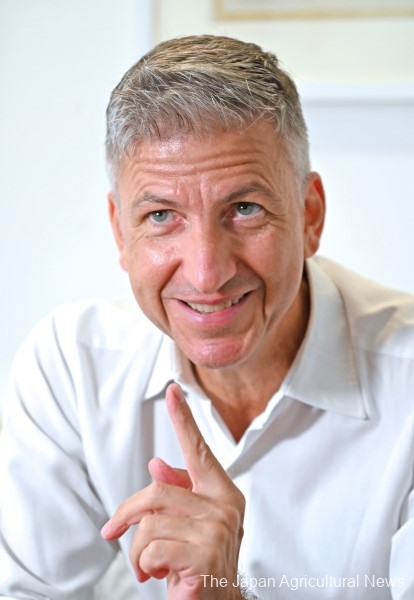 H.E.Mr.Charis Moritsis, First Ambassador of the Republic of Cyprus in Japan, located in the eastern Mediterranean, spoke about the agricultural situation in his country in an interview with the Japan Agricultural Newspaper. He stressed the importance of sustainable agriculture in light of the global rise in the price of food and production materials.
H.E.Mr.Charis Moritsis, First Ambassador of the Republic of Cyprus in Japan, located in the eastern Mediterranean, spoke about the agricultural situation in his country in an interview with the Japan Agricultural Newspaper. He stressed the importance of sustainable agriculture in light of the global rise in the price of food and production materials.
―Please could you introduce your native country of Cyprus
It is an island country in the eastern Mediterranean Sea and a member state of the European Union. Surrounded by Europe, the Middle East and Africa, it is a hub for trade and international business. The main industries are finance and shipping, as well as tourism, being blessed with pristine beaches, a clean sea, a favourable climate and wonderful location. In recent years, ICT (information and communications technology), pharmaceuticals and food manufacturing have also grown.
―What are the characteristics of agriculture in Cyprus? What are the typical/representative agricultural products?
The warm, dry climate allows citrus fruits, olives, potatoes, grapes and avocados to grow in abundance. Some items sell at a high price, such as the prickly pear cactus and aloe vera. Over 50% of agricultural exports are to the EU, followed by other European countries, the Middle East and Asia.
The rise of the service and manufacturing sector has led to a decline in agriculture, and the Government is encouraging farming in order to secure jobs in rural areas and to ease urban congestion. In some areas, urban dwellers farm part-time and small-scale farming activities have halted the decline in population.
―Is there anything you would like to strengthen in agriculture?
This would be the quality improvement and protection of traditional foods. One of these is the traditional cheese Halloumi. It is made from sheep’s or goat’s milk and has a layered shape and a unique texture. More than 40 000 tons are exported annually to more than 40 countries, with an export value of approximately 36 billion yen.
In order to protect this Cypriot ‘treasure’ of a food product, we are in the process of registering the trademark ‘Halloumi / Hellim’ in various countries around the world. Halloumi was also registered under the Protection of Designation of Origin (PDO), the EU’s geographical protection of indications system in 2021.
On the agricultural side, smart farming, environmental protection and animal welfare (comfort-oriented livestock husbandry) have been strengthened over the past two years.
―Global food and production material prices are threatening ‘food security’. What is the impact on Cyprus?
Barley has risen by 60%, pork by 30% and milk and butter by almost 70% in Cyprus. This is an unprecedented increase in prices. Much of the fertiliser and feed is also imported, therefore production costs are largely dependent on import prices.
In the last few years, Cyprus has been focusing on the production of carob (Japanese name = locust bean), which is also suitable for livestock feed. The area of cultivation of carob has reached 1,300 hectares. It is rich in dietary fibre and has a high nutritional value It is also used in syrups, cosmetics and medicines and is attracting much attention as a sustainable plant that can grow in the Cypriot climate.
―Please let us know your impressions of Japan?
Ahead of the Tokyo Olympics, we visited the Cypriot host town of Shimotsuke, Tochigi Prefecture. The excellence of local agricultural and livestock products made me understand and appreciate the high level of Japanese agricultural technology. I was also impressed by the love and bond that the Japanese people have for nature. We would like to cooperate in the agricultural sector and deepen the ties between our two countries.

